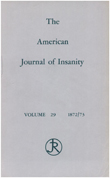Role of the family in recovery and major depression
Abstract
OBJECTIVE: Major depression is significantly influenced by the family environment of the depressed patient. In order to explore how family functioning relates to this illness, the authors examined changes in family functioning over a 1-year course of major depression. METHOD: Subjective (Family Assessment Device) and objective (McMaster Clinical Rating Scale) assessments of family functioning were collected at hospitalization and 6 and 12 months after discharge for 45 inpatients diagnosed with major depression and their family members. Patterns of family functioning were examined by subjective and objective perspectives, initial levels of functioning, and reports of patients and other family members. RESULTS: Approximately 50% of families with a depressed member perceived their own family functioning as unhealthy; clinicians rated 70% of the families as unhealthy. While family functioning improved significantly from hospitalization through 12 months after discharge, the improvement was not uniform across all areas of functioning. Further, patients with good family functioning at hospitalization generally maintained their healthy functioning and were more likely to recover by 12 months than patients with poor family functioning. Although steady improvement in family functioning characterized the subjective ratings, objective assessments of family functioning suggested initial improvement followed by a decline from month 6 to month 12. CONCLUSIONS: Results show a clear association between family functioning and recovery from major depression. Different aspects of family life respond differently to the depressive illness; no one family dimension was uniquely related to outcome.
Access content
To read the fulltext, please use one of the options below to sign in or purchase access.- Personal login
- Institutional Login
- Sign in via OpenAthens
- Register for access
-
Please login/register if you wish to pair your device and check access availability.
Not a subscriber?
PsychiatryOnline subscription options offer access to the DSM-5 library, books, journals, CME, and patient resources. This all-in-one virtual library provides psychiatrists and mental health professionals with key resources for diagnosis, treatment, research, and professional development.
Need more help? PsychiatryOnline Customer Service may be reached by emailing [email protected] or by calling 800-368-5777 (in the U.S.) or 703-907-7322 (outside the U.S.).



